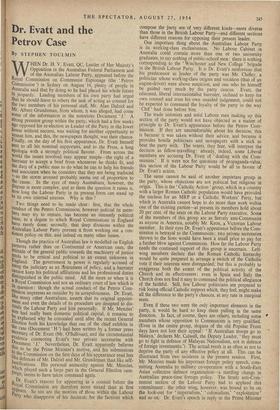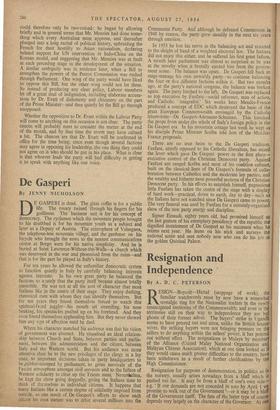Dr. Evatt and the Petrov Case
By STEPHEN TOULMIN HEN Dr. H.. V. Evatt, QC. Leader of Her Majesty's Opposition in the Australian Federal Parliament and of the Australian Labour Party, appeared before the Royal Commission on Communist Espionage (the Petrov Commission ') in Sydney on August 16, plenty of people in Australia said that by doing so he had placed his whole future jeopardy. Leading members of his own party had urged that he should leave to others the task of acting as counsel for the two members of his personal staff, Mr. Alan Dalziel and Mr. Albert Grundeman, from whom, it was alleged, had come some of the information in the notorious Document J.' A strong pressure group within the party, which had a few weeks ago opposed his re-election as Leader of the Party in the lower house without success, was waiting for another opportunity to unseat him, and this, the newspapers thought, was their chance. Finally, on the day of his first appearance, Dr. Evatt himself sent to all his nominal supporters, and to the Press, a long apologia with a strongly political flavour. From across the World the issues involved may appear simple—the right of a barrister to accept a brief from whomever he thinks fit, and the duty of a public man to do what he can to help his friends and associates when he considers that they are being traduced —so the storm aroused probably seems out of proportion to the cause. In the eyes of many Australians, however, the dispute is more complex, and to them the question it raises is, how long the Labour Party in its present form can stand up t9 its own internal stresses. Why is this ?
Two things need to be made clear : first, that the whole conduct of the Petrov Commission, however judicial its mem- bers may try to remain, has become an intensely political issue, to a degree to which Royal Commissions in England have rarely done; secondly, that deep divisions within the Australian Labour Party prevent it from working out a con- sistent policy on this, and indeed on many other issues.
Though the practice of Australian law is modelled on English Patterns rather than on Continental or American ones, the attitude of the general public towards the machinery of justice „tends to be critical and political to an extent unknown in England. The government in power is regularly accused of using the judiciary as an ihstrument of policy, and a barrister cannot keep his political affiliations and his professional duties distinguished in the public mind. All the more so when it is !Royal Commission and not an ordinary court of law which is In question: though the actual conduct of the Petrov Corn- Plission impresses an outsider by its scrupulousness. Dr. Evatt, uke many other Australians, asserts that its original appoint- ;tent and even the details of its procedure are designed to dis- Oredit the Labour Party and him personally. If Mr. Menzies' aim had really been domestic political capital, it remains to te explained why he concealed until after the recent General lection both his knowledge that one of the chief exhibits in the case (Document H ') had been written by a former press Secretary of Dr. Evatt (Mr. O'Sullivan), and the circumstantial !yidence connecting Evatt's two private secretaries with Document J.' Nevertheless, Dr. Evatt apparently believes this to be the Prime Minister's motive, and his submissions to the Commission on the first days of his appearance read less !Ike defences of Mr. Dalziel and Mr. Grundeman than like self- Justifications. His personal animosity against Mr. Menzies, which played such a large part in the General Election cam- Paign, seems to have taken command again.
b Evatt's reasons for appearing as a counsel before the .`cYal Commission are therefore more mixed than at first ;,1313ears. So too are the motives of those within the Labour 'arty who disapprove of his decision; for the factions which compose the party are of very different kinds—more diverse than those in the British Labour Party—and different sections have different reasons for opposing their present leader.
One important thing about. the Australian Labour Party is its working-class exclusiveness. No Labour Cabinet in Australia could contain more than one or two university graduates, to say nothing of public-school men: there is nothing corresponding to the Winchester and New College ' brigade in the British Labour Party. It is Dr. Evatt's misfortune that his predecessor as leader of the party was Mr. Chifley, a politician whose working-class origins and vocation (that of an engine-driver) were above suspicion, and one who let himself be guided very much by the party caucus. Evatt, the educated, liberal internationalist barrister, inclined to keep his own counsel and trust his own unaided judgement, could not be expected to command the loyalty of the party in the way Chif ' had done before him.
The trade unionists and solid Labour men making up this section of the party would not have objected as a matter of principle to Dr. Evatt's appearance before the Petrov Com- mission. If they are uncomfortable about his decision, this is because it was taken without their advice, and because it provides hostile politicians and newspapers with a stick to beat the party with. The voters, they fear, will interpret the decision as fellow-travelling: already, indeed, some Liberal members are accusing Dr. Evatt of dealing with the Com- munists.' If it were not for questions of propaganda-value, this section of the Labour Party would be all in favour of Dr. Evatt's action.
The same cannot be said of another impdrtant group. in the party, whose objections are not political but religious in origin. This is the Catholic Action ' group, which in a country with a larger Roman Catholic population would have provided the nucleus for an MRP or a Catholic Workers' Party, but which in Australia cannot hope to do more than work within one of the existing parties—at present its members hold about 20 per cent. of the seats on the Labour Party executive. Some of the members of this group are as fiercely anti-Communist as anyone in America, notably Mr. Keon, a Victorian Labour member. In their eyes Dr. Evatt's appearance before the Com- mission is betrayal to the Communists: two private secretaries thrown to the lions would have been a small price to pay for a further blow against Communism. How far the Labour Party needs the continued support of this group is uncertain. Left- wing members declare that the Roman Catholic hierarchy would be quite prepared to arrange a switch of the Catholic vote if their interests were disregarded; but this is probably to exaggerate both the extent of the political activity of the Church and its effectiveness: even in Spain and Italy the Church does not find it easy to command the political allegiance of the faithful. Still, few Labour politicians are prepared to risk losing official Catholic support which, they feel, might make all the difference to the party's chances, at any rate in marginal seats.
Even if these two were the only important elements in the party. it would be hard to keep them pulling in the same direction. In fact, of course, there are others, including some members whose opposition to Communism is very qualified. (Even in the centre group, slogans of the old Popular Front days have not lost their appeal: If Australian troops go to Malaya,' declares Mr. Calwell, the Deputy Leader, they must go to fight in defence of Malayan Nationalism, not in defence of foreign investments.') The actual result is as often as not to deprive the party of any effective policy at all. This can be illustrated from two incidents in the present session. First, Mr. Menzies made his important foreign policy speech, com- mitting Australia to military co-operation with a South-East Asian collective defence organisation—a startling change in Australian peace-time foreign policy. The firmly anti-Com-. munist section of the Labour Party had to applaud this commitment: the other wing, however, was bound to be on the look-out for imperialism," colonialism," exploitation' and so on. Dr. Evatt's speech in reply to the Prime Minister could therefore only be two-voiced: he began by allowing briefly and in general terms that Mr. Menzies had done some- thing which every Australian must approve, and thereafter plunged into a long recital of political history, upbraiding the French for their hostility to Asian nationalism, declaring belated support for UN intervention in Indo-China on the Korean model, and suggesting that Mr. Menzies was at fault at each preceding stage in the development of the situation. A similar ambiguity was in evidence later, when a Bill to strengthen the powers of the Petrov Commission was rushed through Parliament. One wing of the party would have liked to oppose this Bill, but the other wing could not let them. So instead of producing any clear policy, Labour members let off a great deal of indignation, including elaborate accusa- tions by Dr. Evatt of dishonesty and chicanery on the part of the Prime Minister—and then quietly let the Bill go through unopposed.
Whether the opposition to Dr. Evatt within the Labour Party will come to anything on this occasion is not clear. The party caucus will probably meet to consider the matter at the end of the month, and by that time the storm may have calmed a bit. The chances are that Dr. Evatt will be confirmed in office for the time being; since even though several factions may agree in opposing his leadership, the one thing they could not agree on is who should be put in his place. What is clear is that whoever leads the party will find difficulty in getting it to speak with anything like one voice.



































 Previous page
Previous page